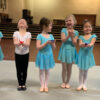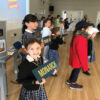
by Angela Schofield
Oracy Lead, Excelsior Multi-Academy Trust
If you are slightly confused about the term ‘oracy’, which has recently hit the headlines, you are not alone! To summarise, oracy is about communication skills, gaining the skills to engage with other people’s ideas and express your own ideas so that others understand them. At Excelsior Multi Academy Trust, we explicitly teach, practise and assess oracy skills, and see demonstrated how speaking and listening are equally important for effective communication.
Why is oracy so important?
Research has shown that oracy supports children in their academic learning and also in their emotional and social wellbeing. It helps to develop their confidence and instils a sense of belonging, that their voice is welcomed and valued. It is also has a key role in closing the disadvantage gap. Early language and communication skills are closely linked to attainment throughout schooling, and to earnings later in life. The earlier we start to develop oracy skills, the better.
How can you make learning these skills fun at home?
• Playing fun listening games. Enjoy games such as I Spy, 1-20 or describing an image while your child draws it and vice versa. These are all quick games, which develop listening skills too. To practise listening specifically, read a short text and then give a list of words, can they remember which words were from the text? Simple riddle games are good for this too. Try the one below. Explain that you are going to tell a story and then you’ll ask them some questions about it.
You are the bus driver. There are four people on the bus. At the first stop, two people get off and a lady with a bright red hat gets on. At the second stop, a man with a green duffle coat gets off and a small boy with a big dog gets on. At the third stop, four people get off and three people get on. At the fourth stop, two girls get on carrying a large present with a frilly purple bow. (You can continue for longer depending on the age of your child). Finally, ask the question – How old is the bus driver? (The clue is in the first five words).
• Reading to your child. Hearing you read a story, with all the different voices, is not only fun and a time to bond with them, but it also supports them to understand how tone of voice can change the meaning of words and make it more interesting to the listener. Hearing a fluent reader, while they look at the text also helps children to develop fluency in reading.
• Encouraging the expressing of opinions, agree and disagree with reasons. This develops reasoning skills and vocabulary and shows them that it’s OK to disagree. An excellent thing to encourage is changing your mind when someone has given a good reason. You can also frame questions as talking points to encourage extended responses. There are lots of ways to do this and you can choose serious or silly talk activities. We live in a world with a diversity of opinions and being able to listen, engage respectfully and come to your own conclusion is a key life skill.
Ask engaging, fun questions such as:
If I ruled the world, I would … because …
Agree or disagree, Wonder Woman/Spider-Man/ Superman (pick a favourite) is superior to …
Which is better a shark or a lion? Why?
• Engaging in dialogue (not just talk). Talking to your child at home is important, but the evidence shows that it is dialogue that helps children learn language and social skills. Turn taking in a conversation is the important part, so try to avoid the questions, answer and move on cycle of interactions. Just chatting and exchanging ideas is so important for child development and hugely enjoyable. We all have such busy lives now but setting aside a time each day just to talk with, rather than to, them will have a significant impact on their learning and social and emotional learning.
• Playing with and exploring vocabulary. Begin with one word and find opposites or as many synonyms as you can, or find out where words come from. Biscuit, for example, comes from the French for twice baked. Before the introduction of effective food storage, baking twice reduced the moisture in the biscuits making them less likely to attract weevils! Children find these sorts of facts fascinating. There are lots of examples online but for older children, the Oxford Dictionary of Word Origins is a useful resource as is the children’s book The Dictionary of Difficult Words.
By starting when your child is young, you’ll not only be helping them to develop their communications skills, you will be giving them a priceless gift that will serve them well throughout their lives. A gift they can, in turn, pass on to the next generation.
Angela Schofield is the Oracy Lead at Excelsior Multi-Academy Trust, which supports six schools in Birmingham. The Trust is committed to ensuring the highest standards of academic performance and places communication skills at the centre of its curriculum. Excelsior provides supports to all its schools to enable them to help their children achieve their goals and ensure they are ready for the next stage of their education. Excelsior MAT was shortlisted for the MAT Excellence awards 2023 in three categories: Employer of the year; Inclusivity; and Wellbeing. www.excelsiormat.org










